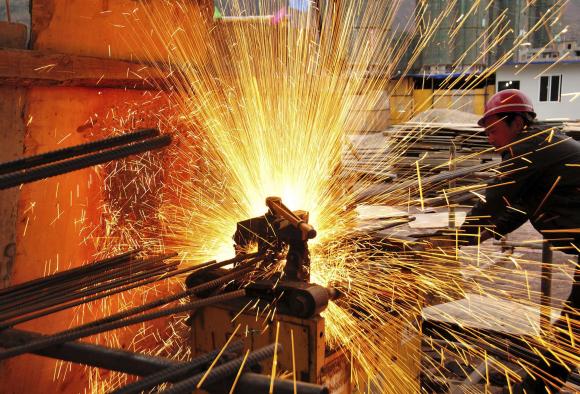 |
|
A worker welds at a construction site in Yiliang, Yunnan province, Feb 28, 2015.[Photo/Agencies] |
Policymakers set a growth target of 7.5 percent for 2014 and 7 percent last year. The lower target range for this year reflects the severe challenges facing Chinese policymakers as they seek to strike a balance between stable growth and economic restructuring, analysts said.
Targets for other key economic indicators are also revealed in the report to be delivered by Premier Li Keqiang.
Growth of the broad measure of money supply, or M2, will be kept at about 13 percent. According to the report, the actual M2 growth last year was 13.3 percent.
The deficit to GDP ratio will be raised to 3 percent this year, compared with 2.4 percent last year, the report says. And it is planned that special bonds worth 400 billion yuan ($61.3 billion) will be issued to help improve the balance sheets of local governments.
The target for growth of fixed-asset investment is 10.5 percent and the target growth for retail sales is 11 percent.
The report says the authorities plan to create 10 million new jobs and the registered urban unemployment rate will be kept below 4.5 percent this year. The target for the consumer price index is a rise of around 3 percent this year, compared with real growth of 1.4 percent in 2015.
The country also plans to cut the energy consumption per unit of GDP by more than 3.4 percent, the report states.
China's GDP grew by 6.9 percent year-on-year in 2015, the slowest pace since 1990, and its foreign exchange reserves fell by more than $500 billion last year, sparking concerns over potential financial risks caused by capital outflows.
The People's Bank of China, the central bank, cut the proportion of cash that commercial banks must put aside as reserves in late February to shore up the economy, with analysts expecting more such cuts and cuts in interest rates this year.
"China has encountered problems in boosting economic growth," said Li Yining, a senior economist and a member of the Chinese People's Political Consultative Conference National Committee. "But these problems can be solved through acceleration of structural reforms," he told reporters on Friday.
Noting that "the employment situation remains sound", Li said he is confident China can achieve its target of 7 percent growth this year, and the country does not need to devalue its currency to stimulate exports.